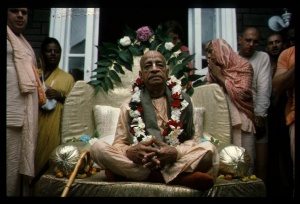CC Madhya 6.147: Difference between revisions
No edit summary |
(Vanibot #0054 edit - transform synonyms into clickable links, which search similar occurrences) |
||
| Line 17: | Line 17: | ||
<div class="synonyms"> | <div class="synonyms"> | ||
''brahma-śabde'' | ''[//vanipedia.org/wiki/Special:VaniSearch?s=brahma&tab=syno_o&ds=1 brahma]-[//vanipedia.org/wiki/Special:VaniSearch?s=śabde&tab=syno_o&ds=1 śabde]'' — by the word “Brahman”; ''[//vanipedia.org/wiki/Special:VaniSearch?s=kahe&tab=syno_o&ds=1 kahe]'' — it is said; ''[//vanipedia.org/wiki/Special:VaniSearch?s=pūrṇa&tab=syno_o&ds=1 pūrṇa]'' — complete; ''[//vanipedia.org/wiki/Special:VaniSearch?s=svayam&tab=syno_o&ds=1 svayam]'' — personally; ''[//vanipedia.org/wiki/Special:VaniSearch?s=bhagavān&tab=syno_o&ds=1 bhagavān]'' — the Supreme Personality of Godhead; ''[//vanipedia.org/wiki/Special:VaniSearch?s=svayam&tab=syno_o&ds=1 svayam]'' — personally; ''[//vanipedia.org/wiki/Special:VaniSearch?s=bhagavān&tab=syno_o&ds=1 bhagavān]'' — the Supreme Personality of Godhead; ''[//vanipedia.org/wiki/Special:VaniSearch?s=kṛṣṇa&tab=syno_o&ds=1 kṛṣṇa]'' — Lord Kṛṣṇa; ''[//vanipedia.org/wiki/Special:VaniSearch?s=śāstrera&tab=syno_o&ds=1 śāstrera] [//vanipedia.org/wiki/Special:VaniSearch?s=pramāṇa&tab=syno_o&ds=1 pramāṇa]'' — the verdict of all Vedic literature. | ||
</div> | </div> | ||
Latest revision as of 23:39, 19 February 2024

A.C. Bhaktivedanta Swami Prabhupada
TEXT 147
- brahma-śabde kahe pūrṇa svayaṁ bhagavān
- svayaṁ bhagavān kṛṣṇa,—śāstrera pramāṇa
SYNONYMS
brahma-śabde — by the word “Brahman”; kahe — it is said; pūrṇa — complete; svayam — personally; bhagavān — the Supreme Personality of Godhead; svayam — personally; bhagavān — the Supreme Personality of Godhead; kṛṣṇa — Lord Kṛṣṇa; śāstrera pramāṇa — the verdict of all Vedic literature.
TRANSLATION
“The word ‘Brahman’ indicates the complete Supreme Personality of Godhead, who is Śrī Kṛṣṇa. That is the verdict of all Vedic literature.
PURPORT
This is also confirmed in the Bhagavad-gītā (BG 15.15), where the Lord says, vedaiś ca sarvair aham eva vedyaḥ. The ultimate object in all Vedic literature is Kṛṣṇa. Everyone is searching for Him. This is also confirmed elsewhere in the Bhagavad-gītā (BG 7.19):
- bahūnāṁ janmanām ante jñānavān māṁ prapadyate
- vāsudevaḥ sarvam iti sa mahātmā sudurlabhaḥ
“After many births and deaths, he who is actually in knowledge surrenders unto Me, knowing Me to be the cause of all causes and all that is. Such a great soul is very rare.”
When one has actually become wise through the study of Vedic literature, he surrenders unto Vāsudeva, Bhagavān Śrī Kṛṣṇa. This is also confirmed in Śrīmad-Bhāgavatam (1.2.7-8):
- vāsudeve bhagavati bhakti-yogaḥ prayojitaḥ
- janayaty āśu vairāgyaṁ jñānaṁ ca yad ahaitukam
- dharmaḥ sv-anuṣṭhitaḥ puṁsāṁ viṣvaksena-kathāsu yaḥ
- notpādayed yadi ratiṁ śrama eva hi kevalam
Understanding Vāsudeva is real knowledge. By engaging in the devotional service of Vāsudeva, Kṛṣṇa, one acquires perfect knowledge and Vedic understanding. Thus one becomes detached from the material world. This is the perfection of human life. Although one may perfectly follow religious rituals and ceremonies, he is simply wasting his time (śrama eva hi kevalam) if he does not attain this perfection.
Before the creation of the cosmic manifestation, the Supreme Personality of Godhead possessed His totally transcendental mind and eyes. That Supreme Personality of Godhead is Kṛṣṇa. A person may think that there is no direct statement about Kṛṣṇa in the Upaniṣads, but the fact is that the Vedic mantras cannot be understood by people with mundane senses. As stated in the Padma Purāṇa, ataḥ śrī-kṛṣṇa-nāmādi na bhaved grāhyam indriyaiḥ: (CC Madhya 17.136) a person with mundane senses cannot fully understand the name, qualities, form and pastimes of Śrī Kṛṣṇa. The Purāṇas are therefore meant to explain and supplement Vedic knowledge. The great sages present the Purāṇas in order to make the Vedic mantras understandable for common men (strī-śūdra-dvija-bandhūnām (SB 1.4.25)). Considering that women, śūdras and dvija-bandhus (unworthy sons of the twice-born) cannot understand the Vedic hymns directly, Śrīla Vyāsadeva compiled the Mahābhārata. Actually, the Supreme Personality of Godhead is vedeṣu durlabham (untraceable in the Vedas), but when the Vedas are properly understood or when Vedic knowledge is received from devotees, one can understand that all Vedic knowledge leads to Śrī Kṛṣṇa.
The Brahma-sūtra (1.1.3) confirms this fact also: śāstra-yonitvāt. Commenting upon this Brahma-sūtra aphorism, Śrī Madhvācārya says, “The Ṛg Veda, Yajur Veda, Sāma Veda, Atharva Veda, Mahābhārata, Pañcarātra and the original Vālmīki Rāmāyaṇa are all Vedic literatures. Any literature following the conclusive statements of these Vedic literatures is also to be considered Vedic literature. That literature which does not conform to Vedic literature is simply misleading.”
Therefore when reading Vedic literature, we must take the path traversed by great ācāryas: mahā-jano yena gataḥ sa panthāḥ. Unless one follows the path traversed by great ācāryas, he cannot understand the real purport of the Vedas.